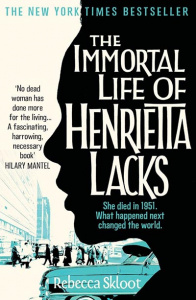The Immortal Life of Henrietta Lacks
 By Rebecca Skloot
By Rebecca Skloot
Review by Jessica (Medicine)
After countless recommendations, The Immortal Life of Henrietta Lacks was a book I had been meaning to read almost since it was first published, but somehow I had never quite got around to it. There was always something more pressing to be read i.e. something fictional. Let’s face it, after a day of being bombarded with information in lectures the last thing I want is to sit down to a book where I run the risk of actually learning something. Oh no, I’ll take fictional escapism any day. But this July, with the horror of exams fading to a distant memory, and two more months of summer holiday looming large ahead of me, I decided to take the plunge.
I needn’t have worried. It reads like the best of fiction.
It tells the story of an African-American woman who died in 1951, aged just 31, of an aggressive cervical cancer. It also tells the story of her legacy: the HeLa cell line, taken from Henrietta’s tumour while she was still alive, cultured in a lab, and discovered to be immortal. After her death HeLa was mass-produced and sold to laboratories all over the world. It has been used in a vast and varied array of scientific research including research into cancer, the human genome, and the development of the polio vaccine, and it continues to be used to this day.
However, it is not the scientific advances which HeLa helped bring about which made this book such an engrossing read for me, but the ethical issues that the book raises. Henrietta does not give consent for the mass-production and sale of her cells, and her family don’t see a penny of the profits from HeLa. In fact, they do not even learn of its existence until years after Henrietta’s death, and, once they do, are deeply disturbed by the idea that their mother’s cells are being experimented on. Given the focus on informed consent and communication in modern medicine, I found the complete lack of communication with Henrietta and her family shocking. Understandably it breeds in them a mistrust of health professionals and authority more generally. Skloot’s sensitive portrayal of Henrietta’s surviving children and their struggle to understand their mother’s “immortality” is interwoven with stories of other individuals whose tissues have been bought and sold, with or without their consent, to ask the compelling question: who owns our cells once they are no longer part of us?
The Immortal Life of Henrietta Lacks is a book I wish I had read long ago, so that, when asked the inevitable “what have you been reading?” in medical school interviews I would have been able to answer with genuine passion and interest.
Review by Lizzie (Medicine)
I was intrigued by Rebecca Skloot’s book because it was so different from the other popular science books I had read before coming to Oxford. Encompassing science, ethics and biography, The Immortal Life of Henrietta Lacks is as much a fascinating story as it is a book on medical science.
Henrietta Lacks was an African-American woman who died in 1951 from cervical cancer. During treatment for her cancer, a tissue sample of her tumour was kept and used for scientific research without her consent, unknown to her family until 1975. These cells are the source of the HeLa cell line, which is still used for medical research today and has contributed to research into cancer, cosmetic testing, and the development of the polio vaccine.
The book follows the author’s journey of discovery as she finds out more about the cell line, the impact that the commercialisation of Henrietta’s cells has had on her surviving family and most importantly about Henrietta Lacks herself. This really made me consider the people throughout history without whom scientific advances would not have been possible and whether they consented to it or were even aware of it.
Issues around consent, privacy and ownership were brought forward in relation to how laws have changed, the thoughts and feelings of the Lacks family and the discussion of similar cases of the commercialisation of human tissue. Should something that has been a part of us – a cell, tissue or organ – belong to us once it is removed from our body?
I think one of the most important aspects of this book is that it surpasses just a list of medical facts and instead introduces us to the people affected by science. Although the book discusses the impact HeLa cells have had on medicine, Henrietta’s cancer and how HeLa cells achieve their immortality, what I really learnt from this book is that so many decisions that doctors make have ethical implications.
The Immortal Life of Henrietta Lacks by Rebecca Skloot
ISBN-10: 0330533444
ISBN-13: 9780330533447
Try checking the availability of this book at your school or local library or explore second hand bookshops and websites. You may also wish to purchase from either Amazon or Blackwell’s.
